- Home
- Lord Dunsany
Fifty-One Tales Page 2
Fifty-One Tales Read online
Page 2
DEATH AND ODYSSEUS
In the Olympian courts Love laughed at Death, because he wasunsightly, and because She couldn't help it, and because he neverdid anything worth doing, and because She would.
And Death hated being laughed at, and used to brood apart thinkingonly of his wrongs and of what he could do to end this intolerabletreatment.
But one day Death appeared in the courts with an air and They allnoticed it. "What are you up to now?" said Love. And Death withsome solemnity said to Her: "I am going to frighten Odysseus"; anddrawing about him his grey traveller's cloak went out through thewindy door with his jowl turned earthwards.
And he came soon to Ithaca and the hall that Athene knew, andopened the door and saw there famous Odysseus, with his whitelocks bending close over the fire, trying to warm his hands.
And the wind through the open door blew bitterly on Odysseus.
And Death came up behind him, and suddenly shouted.
And Odysseus went on warming his pale hands.
Then Death came close and began to mouth at him. And after awhile Odysseus turned and spoke. And "Well, old servant," he said,"have your masters been kind to you since I made you work for meround Ilion?"
And Death for some while stood mute, for he thought of the laughterof Love.
Then "Come now," said Odysseus, "lend me your shoulder," and heleaning heavily on that bony joint, they went together through the opendoor.
DEATH AND THE ORANGE
Two dark young men in a foreign southern land sat at a restauranttable with one woman.
And on the woman's plate was a small orange which had an evillaughter in its heart.
And both of the men would be looking at the woman all the time, andthey ate little and they drank much.
And the woman was smiling equally at each.
Then the small orange that had the laughter in its heart rolledslowly off the plate on to the floor. And the dark young men bothsought for it at once, and they met suddenly beneath the table, andsoon they were speaking swift words to one another, and a horrorand an impotence came over the Reason of each as she sat helplessat the back of the mind, and the heart of the orange laughed and thewoman went on smiling; and Death, who was sitting at another table,tete-a-tete with an old man, rose and came over to listen to the quarrel.
THE PRAYER OF THE FLOWERS
It was the voice of the flowers on the West wind, the lovable, theold, the lazy West wind, blowing ceaselessly, blowing sleepily, goingGreecewards.
"The woods have gone away, they have fallen and left us; men loveus no longer, we are lonely by moonlight. Great engines rush overthe beautiful fields, their ways lie hard and terrible up and down theland.
"The cancrous cities spread over the grass, they clatter in their lairscontinually, they glitter about us blemishing the night.
"The woods are gone, O Pan, the woods, the woods. And thou artfar, O Pan, and far away."
I was standing by night between two railway embankments on theedge of a Midland city. On one of them I saw the trains go by, oncein every two minutes, and on the other, the trains went by twice inevery five.
Quite close were the glaring factories, and the sky above them worethe fearful look that it wears in dreams of fever.
The flowers were right in the stride of that advancing city, andthence I heard them sending up their cry. And then I heard, beatingmusically up wind, the voice of Pan reproving them from Arcady--
"Be patient a little, these things are not for long."
TIME AND THE TRADESMAN
Once Time as he prowled the world, his hair grey not with weaknessbut with dust of the ruin of cities, came to a furniture shop and enteredthe Antique department. And there he saw a man darkening the woodof a chair with dye and beating it with chains and making imitationwormholes in it.
And when Time saw another doing his work he stood by him awhileand looked on critically.
And at last he said: "That is not how I work," and he turned the man'shair white and bent his back and put some furrows in his little cunningface; then turned and strode away, for a mighty city that was wearyand sick and too long had troubled the fields was sore in need of him.
THE LITTLE CITY
I was in the pre-destined 11.8 from Goraghwood to Drogheda, whenI suddenly saw the city. It was a little city in a valley, and only seemedto have a little smoke, and the sun caught the smoke and turned itgolden, so that it looked like an old Italian picture where angels walkin the foreground and the rest is a blaze of gold. And beyond, as onecould tell by the lie of land although one could not see through thegolden smoke, I knew that there lay the paths of the roving ships.
All round there lay a patchwork of small fields all over the slopes ofthe hills, and the snow had come upon them tentatively, but alreadythe birds of the waste had moved to the sheltered places for everyomen boded more to fall. Far away some little hills blazed like anaureate bulwark broken off by age and fallen from the earthwardrampart of Paradise. And aloof and dark the mountains staredunconcernedly seawards.
And when I saw those grey and watchful mountains sitting wherethey sat while the cities of the civilization of Araby and Asia aroselike crocuses, and like crocuses fell, I wondered for how long therewould be smoke in the valley and little fields on the hills.
THE UNPASTURABLE FIELDS
Thus spake the mountains: "Behold us, even us; the old ones, thegrey ones, that wear the feet of Time. Time on our rocks shall breakhis staff and stumble: and still we shall sit majestic, even as now,hearing the sound of the sea, our old coeval sister, who nurses thebones of her children and weeps for the things she has done.
"Far, far, we stand above all things; befriending the little cities untilthey grow old and leave us to go among the myths.
"We are the most imperishable mountains."
And softly the clouds foregathered from far places, and crag oncrag and mountain upon mountain in the likeness of Caucasus uponHimalaya came riding past the sunlight upon the backs of storms andlooked down idly from their golden heights upon the crests of themountains.
"Ye pass away," said the mountains.
And the clouds answered, as I dreamed or fancied,
"We pass away, indeed we pass away, but upon our unpasturablefields Pegasus prances. Here Pegasus gallops and browses uponsong which the larks bring to him every morning from far terrestrialfields. His hoof-beats ring upon our slopes at sunrise as though ourfields were of silver. And breathing the dawn-wind in dilated nostrils,with head tossed upwards and with quivering wings, he stands andstares from our tremendous heights, and snorts and sees far-futurewonderful wars rage in the creases and the folds of the togas thatcover the knees of the gods."
THE WORM AND THE ANGEL
As he crawled from the tombs of the fallen a worm met with an angel.
And together they looked upon the kings and kingdoms, and youthsand maidens and the cities of men. They saw the old men heavy intheir chairs and heard the children singing in the fields. They saw farwars and warriors and walled towns, wisdom and wickedness, andthe pomp of kings, and the people of all the lands that the sunlight knew.
And the worm spake to the angel saying: "Behold my food."
"Be dakeon para Thina poluphloisboio Thalassaes," murmured theangel, for they walked by the sea, "and can you destroy that too?"
And the worm paled in his anger to a greyness ill to behold, for forthree thousand years he had tried to destroy that line and still itsmelody was ringing in his head.
THE SONGLESS COUNTRY
The poet came unto a great country in which there were no songs.And he lamented gently for the nation that had not any little foolishsongs to sing to itself at evening.
And at last he said: "I will make for them myself some little foolishsongs so that they may be merry in the lanes and happy by thefireside." And for some days he made for them aimless songs suchas maidens sing on the hills in the older happier countries.
Then he went to some of that nation as they sat weary with
thework of the day and said to them: "I have made you some aimlesssongs out of the small unreasonable legends, that are somewhat akinto the wind in the vales of my childhood; and you may care to singthem in your disconsolate evenings."
And they said to him:
"If you think we have time for that sort of nonsense nowadaysyou cannot know much of the progress of modern commerce."
And then the poet wept for he said: "Alas! They are damned."
THE LATEST THING
I saw an unclean-feeder by the banks of the river of Time. He crouchedby orchards numerous with apples in a happy land of flowers; colossalbarns stood near which the ancients had stored with grain, and the sunwas golden on serene far hills behind the level lands. But his back wasto all these things. He crouched and watched the river. And whateverthe river chanced to send him down the unclean-feeder clutched atgreedily with his arms, wading out into the water.
Now there were in those days, and indeed still are, certain uncleanlycities upon the river of Time; and from them fearfully nameless thingscame floating shapelessly by. And whenever the odor of these camedown the river before them the unclean-feeder plunged into the dirtywater and stood far out, expectant. And if he opened his mouth onesaw these things on his lips.
Indeed from the upper reaches there came down sometimes thefallen rhododendron's petal, sometimes a rose; but they were uselessto the unclean-feeder, and when he saw them he growled.
A poet walked beside the river's bank; his head was lifted and hislook was afar; I think he saw the sea, and the hills of Fate from whichthe river ran. I saw the unclean-feeder standing voracious, up to hiswaist in that evil-smelling river.
"Look," I said to the poet.
"The current will sweep him away," the poet said.
"But those cities that poison the river," I said to him.
He answered: "Whenever the centuries melt on the hills of Fate theriver terribly floods."
THE DEMAGOGUE AND THE DEMI-MONDE
A demagogue and a demi-mondaine chanced to arrive together atthe gate of Paradise. And the Saint looked sorrowfully at them both.
"Why were you a demagogue?" he said to the first.
"Because," said the demagogue, "I stood for those principles thathave made us what we are and have endeared our Party to the greatheart of the people. In a word I stood unflinchingly on the plank ofpopular representation."
"And you?" said the Saint to her of the demi-monde.
"I wanted money," said the demi-mondaine.
And after some moments' thought the Saint said: "Well, come in;though you don't deserve to."
But to the demagogue he said: "We genuinely regret that the limitedspace at our disposal and our unfortunate lack of interest in thoseQuestions that you have gone so far to inculate and have so ablyupheld in the past, prevent us from giving you the support for whichyou seek."
And he shut the golden door.
THE GIANT POPPY
I dreamt that I went back to the hills I knew, whence on a clear dayyou can see the walls of Ilion and the plains of Roncesvalles. Thereused to be woods along the tops of those hills with clearings in themwhere the moonlight fell, and there when no one watched the fairiesdanced.
But there were no woods when I went back, no fairies nor distantglimpse of Ilion or plains of Roncesvalles, only one giant poppy wavedin the wind, and as it waved it hummed "Remember not." And by itsoak-like stem a poet sat, dressed like a shepherd and playing anancient tune softly upon a pipe. I asked him if the fairies had passedthat way or anything olden.
He said: "The poppy has grown apace and is killing gods andfairies. Its fumes are suffocating the world, and its roots drain itof its beautiful strength." And I asked him why he sat on the hills Iknew, playing an olden tune.
And he answered: "Because the tune is bad for the poppy, whichwould otherwise grow more swiftly; and because if the brotherhoodof which I am one were to cease to pipe on the hills men would strayover the world and be lost or come to terrible ends. We think we havesaved Agamemnon."
Then he fell to piping again that olden tune, while the wind among thepoppy's sleepy petals murmured "Remember not. Remember not."
ROSES
I know a roadside where the wild rose blooms with a strangeabundance. There is a beauty in the blossoms too of an almostexotic kind, a taint of deeper pink that shocks the Puritan flowers.Two hundred generations ago (generations, I mean, of roses) thiswas a village street; there was a floral decadence when they left theirsimple life and the roses came from the wilderness to clamber roundhouses of men.
Of all the memories of that little village, of all the cottages that stoodthere, of all the men and women whose homes they were, nothingremains but a more beautiful blush on the faces of the roses.
I hope that when London is clean passed away and the defeated fieldscome back again, like an exiled people returning after a war, they mayfind some beautiful thing to remind them of it all; because we have loveda little that swart old city.
THE MAN WITH THE GOLDEN EAR-RINGS
It may be that I dreamed this. So much at least is certain--that Iturned one day from the traffic of a city, and came to its docks andsaw its slimy wharves going down green and steep into the water, andsaw the huge grey river slipping by and the lost things that went with itturning over and over, and I thought of the nations and unpitying Time,and saw and marvelled at the queenly ships come newly from the sea.
It was then, if I mistake not, that I saw leaning against a wall, with hisface to the ships, a man with golden ear-rings. His skin had the darktint of the southern men: the deep black hairs of his moustache werewhitened a little with salt; he wore a dark blue jacket such as sailorswear, and the long boots of seafarers, but the look in his eyes wasfurther afield than the ships, he seemed to be beholding the farthestthings.
Even when I spoke to him he did not call home that look, butanswered me dreamily with that same fixed stare as though histhoughts were heaving on far and lonely seas. I asked him what shiphe had come by, for there were many there. The sailing ships werethere with their sails all furled and their masts straight and still like awintry forest; the steamers were there, and great liners, puffing up idlesmoke into the twilight. He answered he had come by none of them.I asked him what line he worked on, for he was clearly a sailor; Imentioned well-known lines, but he did not know them. Then I askedhim where he worked and what he was. And he said: "I work in theSargasso Sea, and I am the last of the pirates, the last left alive." AndI shook him by the hand I do not know how many times. I said: "Wefeared you were dead. We feared you were dead." And he answeredsadly: "No. No. I have sinned too deeply on the Spanish seas: I amnot allowed to die."
THE DREAM OF KING KARNA-VOOTRA
King Karna-Vootra sitting on his throne commanding all things said:"I very clearly saw last night the queenly Vava-Nyria. Though partlyshe was hidden by great clouds that swept continually by her, rollingover and over, yet her face was unhidden and shone, being full ofmoonlight.
"I said to her:
"'Walk with me by the great pools in many-gardened, beautifulIstrakhan where the lilies float that give delectable dreams; or,drawing aside the curtain of hanging orchids, pass with me thencefrom the pools by a secret path through the else impassable junglethat fills the only way between the mountains that shut in Istrakhan.They shut it in and look on it with joy at morning and at evening whenthe pools are strange with light, till in their gladness sometimes theremelts the deadly snow that kills upon lonely heights the mountaineer.They have valleys among them older than the wrinkles in the moon.
"'Come with me thence or linger with me there and either we shallcome to romantic lands which the men of the caravans only speakof in song; or else we shall listlessly walk in a land so lovely thateven the butterflies that float about it when they see their imagesflash in the sacred pools are terrified by their beauty, and each nightwe shall hear the myriad nightingales all in one chorus sing the starsto death. Do this and I will send heralds far from here with tidingsof
thy beauty; and they shall run and come to Sendara and menshall know it there who herd brown sheep; and from Sendara therumour shall spread on, down either bank of the holy river of Zoth,till the people that make wattles in the plains shall hear of it and sing;but the heralds shall go northward along the hills until they come toSooma. And in that golden city they shall tell the kings, that sit in theirlofty alabaster house, of thy strange and sudden smiles. And often indistant markets shall thy story be told by merchants out from Soomaas they sit telling careless tales to lure men to their wares.
"'And the heralds passing thence shall come even to Ingra, toIngra where they dance. And there they shall tell of thee, so thatthy name long hence shall be sung in that joyous city. And there theyshall borrow camels and pass over the sands and go by desert waysto distant Nirid to tell of thee to the lonely men in the mountainmonasteries.
"'Come with me even now for it is Spring.'"
"And as I said this she faintly yet perceptibly shook her head. And itwas only then I remembered my youth was gone, and she dead fortyyears."
THE STORM
They saw a little ship that was far at sea and that went by the nameof the _Petite Esperance_. And because of its uncouth rig and itslonely air and the look that it had of coming from strangers' lands theysaid: "It is neither a ship to greet nor desire, nor yet to succor when inthe hands of the sea."

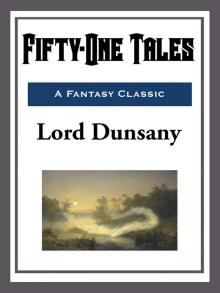 Fifty-One Tales
Fifty-One Tales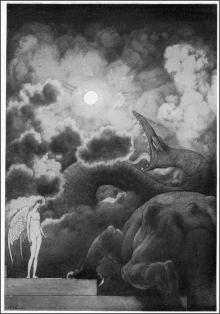 Time and the Gods
Time and the Gods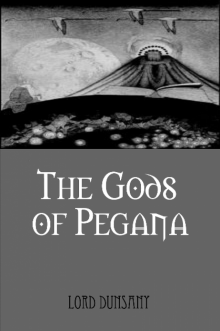 The Gods of Pegana
The Gods of Pegana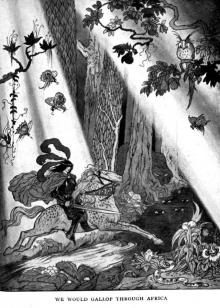 A Dreamer's Tales
A Dreamer's Tales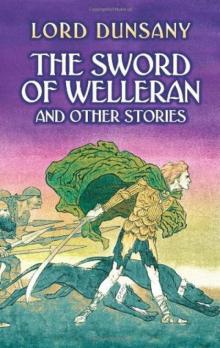 The Sword of Welleran and Other Stories
The Sword of Welleran and Other Stories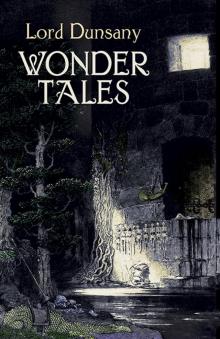 Tales of Wonder
Tales of Wonder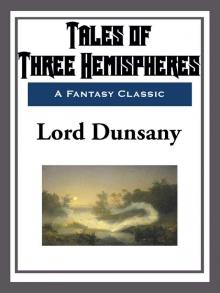 Tales of Three Hemispheres
Tales of Three Hemispheres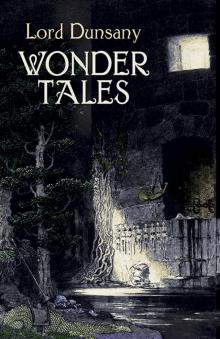 The Book of Wonder
The Book of Wonder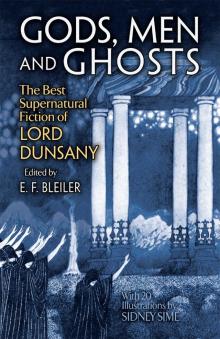 Gods, Men and Ghosts
Gods, Men and Ghosts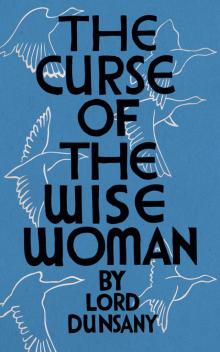 The Curse of the Wise Woman
The Curse of the Wise Woman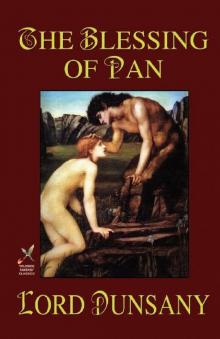 The Blessing of Pan
The Blessing of Pan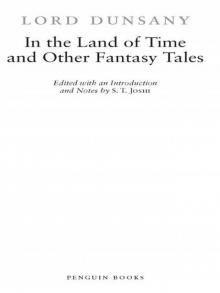 In the Land of Time
In the Land of Time